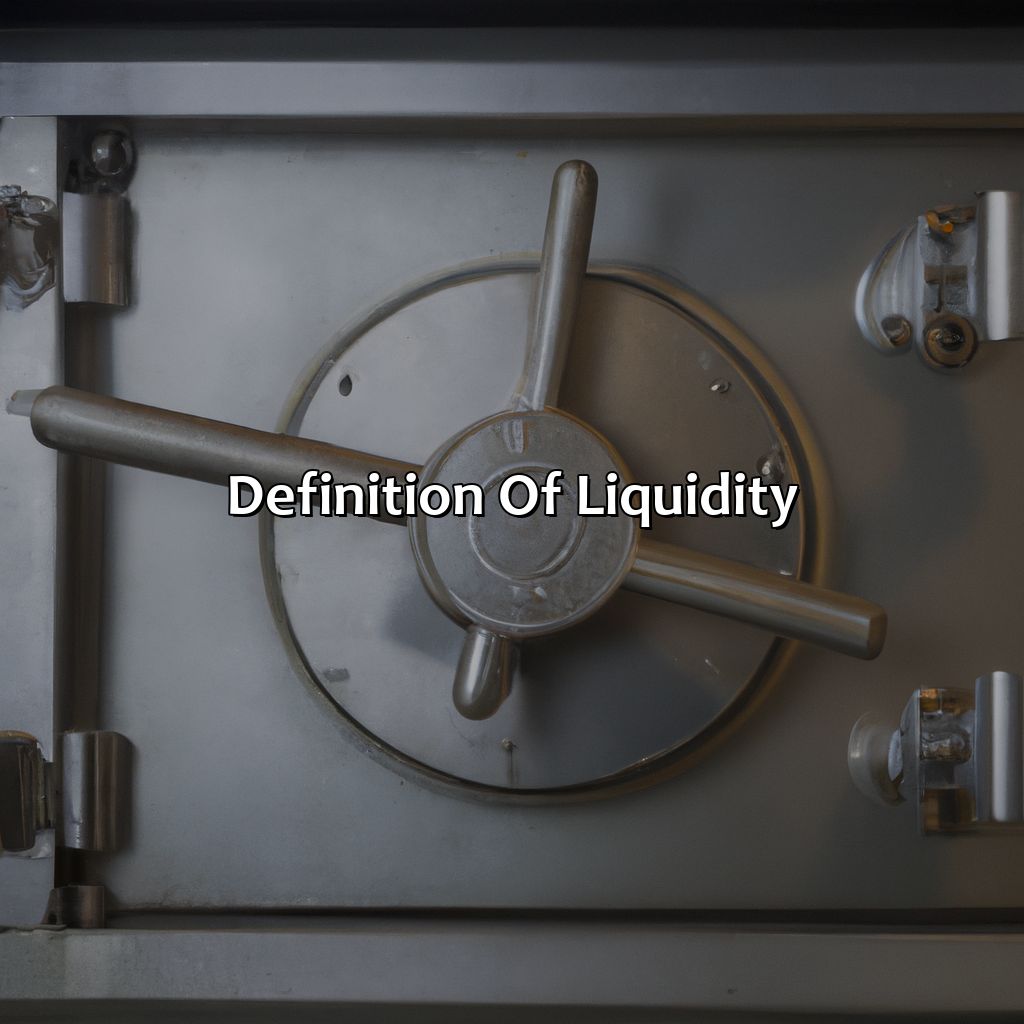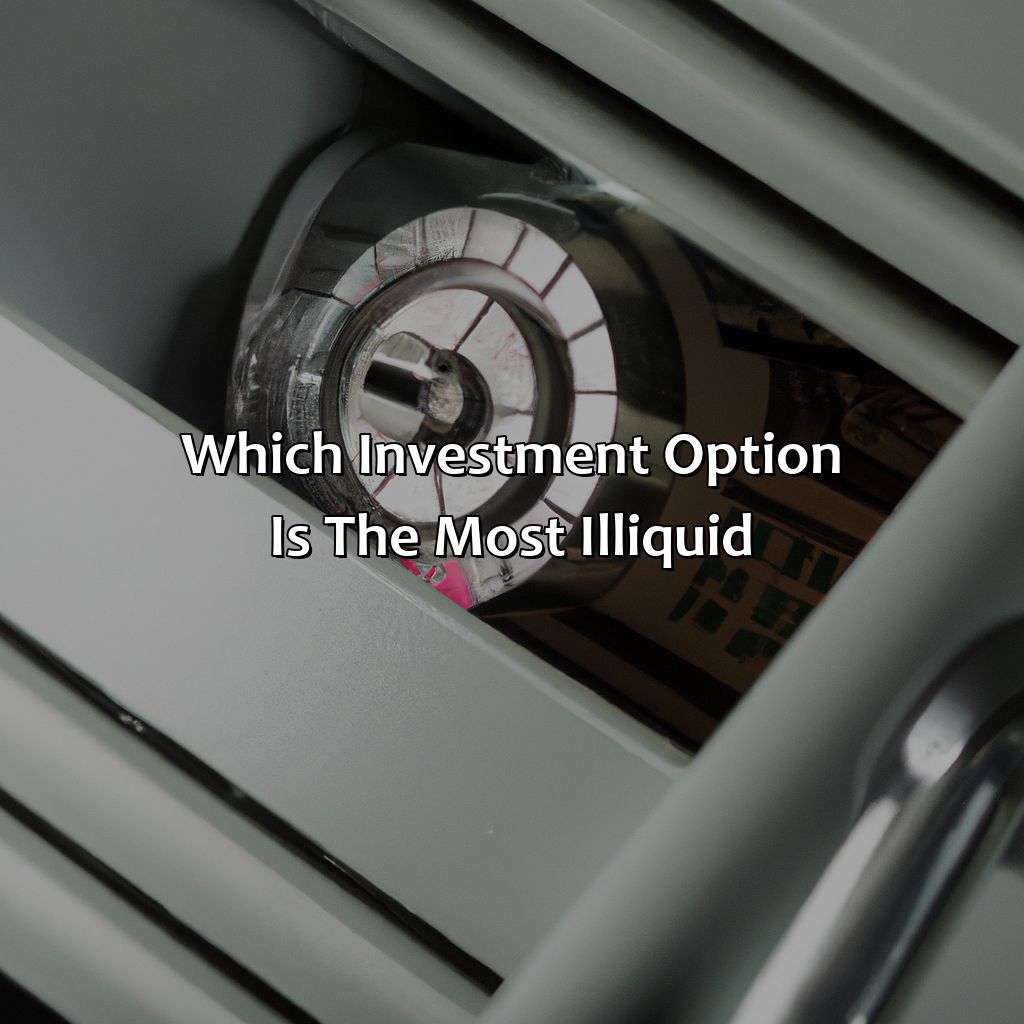Which Investment Option Is The Most Illiquid?
Key takeaway:
- Liquidity refers to the ability of an investment to be quickly and easily converted into cash without significant loss of value. The more illiquid an investment is, the more difficult it is to buy or sell it quickly and at a fair price.
- Factors affecting the liquidity of investments include the type of investment and market conditions. For example, investments in real estate and precious metals tend to be more illiquid than stocks and bonds, especially during economic downturns.
- Of the different investment options, real estate is generally considered to be the most illiquid. Unlike stocks and other securities, which can be bought and sold on a daily basis, real estate transactions can take weeks or even months to complete, making it a challenging asset to liquidate quickly.
Tired of trying to figure out which investment option is the most illiquid? You’re in luck! This article will provide you with a comprehensive overview of the various risk levels associated with certain investments. Get ready to make informed decisions and experience smart investing!
Definition of Liquidity
Liquidity can be defined as the ease with which an asset can be converted into cash without significant loss of value. It relates to the ability to trade an asset quickly and without affecting its market price. Essentially, an asset is considered liquid if it can be sold quickly at a fair market price. Liquidity is essential for financial stability, as it ensures that market participants can easily trade assets and access funds when needed.
In the context of investments, liquidity is an important consideration for investors. Some investments, such as stocks and bonds, are highly liquid because they can easily be bought and sold on public markets. However, other investments, such as real estate and private equity, are much less liquid. This means that they cannot be easily sold when needed, making them more illiquid.
Illiquid investments can pose significant risks for investors. If an investor needs to access funds quickly, they may not be able to sell their illiquid investment at a fair price. This could result in significant losses and financial hardship. Therefore, it is important for investors to carefully consider the liquidity of their investments and ensure that they are balanced with their liquidity needs.
Investors should also be aware that the liquidity of an investment can change over time. For example, a stock that is highly liquid today may become illiquid if market conditions change. Therefore, it is important to regularly review the liquidity of investments and make changes as needed to ensure that they remain aligned with your investment goals.

Image credits: retiregenz.com by James Woodhock
Factors Affecting Liquidity of Investments
To understand how to boost your investment’s liquidity, dig into Factors Affecting Liquidity. Focus on Type of Investment and Market Conditions.
Examining these two parts will give you insight into the factors that influence the liquidity (or lack thereof) of various investments in different markets.

Image credits: retiregenz.com by Yuval Jones
Type of Investment
Different Asset Classes and their Influence on Liquidity
A table showcasing the liquidity of various asset classes is presented below. The asset’s capability to be converted into cash without significant loss to its original value determines its liquidity.
| Asset Class | Liquidity Comparison with Highest Liquid Asset |
|---|---|
| Cash and Equivalents | Most Liquid |
| Treasury Bills | Highly Liquid |
| Bonds | Moderately Liquid |
| Stocks | Less Liquid |
| Real Estate | Illiquid |
A crucial factor that affects liquidity is the availability of buyers and sellers in the market. Moreover, financial and economic conditions, government regulations, credit rating changes, and currency exchange fluctuations also influence liquidity.
Recently, a real estate investor experienced difficulty when they learned that they could not liquidate their property assets due to the downturn in the market. They had invested a significant amount but were unable to find buyers because the assets had become illiquid.
The market conditions are so dry, even a camel would struggle to find liquid investments.
Market Conditions
The liquidity of investments can be affected by several market factors. These factors include changes in interest rates, economic conditions, and global events. Investments in less liquid options, such as real estate or private equity, may face greater challenges during market downturns due to their limited ability for quick exit strategies.
Investors need to consider key market factors before deciding on their investment options as these factors could make a significant impact on the liquidity of their investments. In addition to this, they must also take into account their investment objectives and risk tolerance while selecting from various investment options.
It is crucial for investors to seek advice from financial experts and conduct comprehensive analysis before making any investment decisions. An informed decision will safeguard against potential losses and ensure that the selected investments fulfill their long-term financial goals.
Don’t miss out on the opportunity to secure your financial future by ignoring the important market conditions affecting the liquidity of your investments. Take necessary steps today to stay ahead of the game!
Choosing your investment option based on its liquidity is like choosing your car based on its ability to fly – it’s not the most important feature, but it’s good to know it’s there.
Comparison of Liquidity of Different Investment Options
Let’s compare the liquidity of different investments. We’ll focus on stocks and bonds, real estate, and precious metals. Each has its own unique liquidity difficulties. To work out which one is the least liquid, we need to study them all.

Image credits: retiregenz.com by David Arnold
Stocks and Bonds
Investments in Equities and Debt Securities
For evaluating the liquidity of different investment options, it is imperative to consider equities and debt securities. Both options are traded on exchanges globally; however, they have unique characteristics that affect their liquidity.
The table below summarizes the differences between stocks and bonds in terms of liquidity based on various factors such as trading volume, bid-ask spread, price impact, and speed of settlement:
| Factors | Stocks | Bonds |
|---|---|---|
| Trading Volume | High | Low |
| Bid-Ask Spread | Variable; Wide | Narrow; Stable |
| Price Impact | High | Low |
| Speed of | T+2 (Settlement time) | Same day / T+1 (Settlement time) |
Apart from these factors, market conditions also significantly affect equity and bond liquidity. For example, during a financial crisis or bear market, equity markets can experience high volatility resulting in low liquidity. On the other hand, treasury bonds have historically experienced increased demand during economic downturns because investors seek safe havens.
It’s worth considering that while equities are generally more liquid than bonds due to their higher trading volumes and shorter settlement times, some blue-chip stocks may have lower liquidity levels due to limited supply or demand.
Considering all of these points, it is essential for investors to evaluate their investment objectives and risk tolerance before making any decisions concerning stock or bond investments.
Don’t miss out on opportunities to optimize your portfolio! Explore different strategies with an understanding of investment risks inherent in each option.
Buying real estate is like getting a tattoo, it’s a commitment you can’t wash off with soap and water.
Real Estate
Real Property
Real Property is a popular investment option due to its potential for long-term appreciation, rental income, and tax benefits. However, it is also considered one of the most illiquid investments, as it can be difficult to buy or sell quickly compared to other options. This makes Real Property more suitable for investors who are willing to hold onto their investment for an extended period.
Acquiring real property requires significant capital investment, and selling it quickly can often lead to losses or low returns. Additionally, finding a buyer or tenant can take time, which further adds to the illiquidity of real property. Overall, investors who have a long-term horizon and are willing to incur higher risks will benefit from investing in Real Property.
Investors who wish to mitigate the illiquidity risk of real estate may consider diversifying their portfolio with other more liquid assets such as mutual funds or exchange-traded funds. Another option is investing in real estate through a Real Estate Investment Trust (REIT), which offers greater liquidity by enabling investors to buy and sell shares like stocks.
To summarize briefly, while Real Property has many benefits as an investment option, it comes with high levels of illiquidity that need considerable consideration before purchase. Investors should diversify their portfolio when investing in Real Estate and look into REITs if they want more flexibility in buying and selling shares promptly.
Gold may be a precious metal, but it’s not exactly liquid-gold when it comes to investment options.
Precious Metals
A popular investment option, precious metals are known for their high value and longevity. They consist of rare materials like gold, silver, platinum, and palladium.
| Material | Liquidity |
|---|---|
| Gold | High |
| Silver | Medium-High |
| Platinum | Low-Medium |
| Palladium | Low-Medium |
Precious metals offer a safe haven for investors in times of economic uncertainty. They are easy to buy and sell and have a readily available market. However, storage costs can be high, and their value can fluctuate drastically.
Pro Tip: Before investing in precious metals, research the costs associated with storing them appropriately.
Five Facts About Illiquid Investment Options:
Illiquid investment options are those that cannot be easily converted into cash. (Source: The Balance)
Examples of illiquid investment options include real estate, private equity, and certain types of bonds. (Source: Forbes)
Illiquid investments often have a high potential for returns, but with greater risk and uncertainty. (Source: Investopedia)
Illiquid investments typically require a longer investment horizon and a higher minimum investment amount. (Source: The Street)
Illiquid investments may be suitable for investors with a long-term investment strategy and a high tolerance for risk. (Source: U.S. Securities and Exchange Commission)
FAQs about Which Investment Option Is The Most Illiquid?
Which investment option is the most illiquid?
The most illiquid investment is typically real estate. This is because it can take a long time to find a buyer, finalize a sale, and receive funds. Other illiquid options include private equity and hedge funds, which also have long lock-up periods.
Why is real estate the most illiquid investment?
Real estate is the most illiquid investment because it is a physical asset that can take time to sell. Additionally, transactions often involve a significant amount of paperwork and due diligence, which can further delay the process.
What are the drawbacks of investing in illiquid options?
The biggest drawback is limited access to your funds. With illiquid investments, it can take weeks, months, or even years to get your money back. This can be a problem if you need cash quickly or if you want to take advantage of another investment opportunity.
Are there any advantages to investing in illiquid options?
Yes. Illiquid investments often offer higher returns than more liquid options. This is because they require a longer commitment, and therefore, investors are compensated for the additional risk and lack of flexibility.
How do you determine if an investment is illiquid?
A good rule of thumb is to consider the time required to access your funds. If it takes longer than a few days to get your money back, it’s likely an illiquid investment. Another indicator is the presence of a lock-up period, which means that investors cannot withdraw their funds for a certain period.
What should you consider before investing in an illiquid option?
Before investing in an illiquid option, you should consider your financial goals and if you can afford to have your money tied up for an extended period. Additionally, you should research the investment and the company or individual offering it to ensure that it aligns with your values and has a strong track record. It’s also recommended to seek advice from a financial advisor.
 Checkout this IRS Loophole
Checkout this IRS Loophole 
